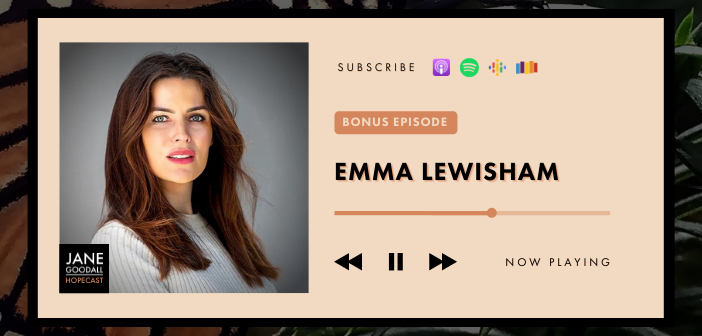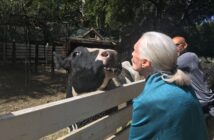Full Transcript:
Speaker 1 (00:04):
We are all connected, all our voices matter, and it will take all of our bold talents and strengths to create a healthier planet.
Speaker 2 (00:11):
Our mother, our one and only.
Speaker 3 (00:13):
I aspire to change the world too because of the hope she gave me.
Speaker 4 (00:16):
The Earth is beautiful.
Speaker 5 (00:18):
She devoted her life to this.
Speaker 6 (00:19):
Together we can save the world.
Speaker 7 (00:23):
Together we can. Together we will.
Dr. Jane Goodall (00:23):
What is your greatest reason for hope? I’m Jane Goodall, and this is the Hopecast.
Dr. Jane Goodall (00:35):
Today I get to speak with CEO, Emma Lewisham. Emma co-founded an entirely new line of beauty products, created when she discovered the lack of natural, sustainable, scientifically supported skincare products.
Dr. Jane Goodall (00:52):
Emma also realized that the beauty industry was contributing to many of the environmental issues we’re facing today, and this motivated and inspired her to create her own brand that would challenge these harmful norms.
Dr. Jane Goodall (01:08):
Emma believes strongly in responsible sourcing and sustainable packaging and has a zero tolerance policy for animal testing. Her brand has also recently announced their role as a carbon positive company where refilling, returning empties, and regenerating the Earth are simply responsible business practices.
Dr. Jane Goodall (01:33):
I’m excited to speak with Emma about her company’s innovative circular business model and to discuss how other companies can work together to preserve the beauty of our world. I hope you enjoy this hopeful conversation with Emma Lewisham.
Dr. Jane Goodall (01:57):
Well, Emma, it’s fantastic to meet you, and I really want to welcome you onto this edition of Hopecast. It’s great to have you here. Welcome.
Emma Lewisham (02:06):
Thank you so much, Jane. It’s an honor to be here.
Dr. Jane Goodall (02:09):
I’ve been reading up about your products. What I wanted to say to you is, first of all, I love your ethic, making everything recyclable, reusable. What got you into it? How were you as a little girl? Was there anything that made you interested in it all that time ago?
Emma Lewisham (02:29):
It’s a really good question. I think as a child I’ve always been someone that was highly curious and asked questions and looked at doing things better, and at times it did get me in trouble being like that. That was the spirit that I had and it was very much encouraged by my parents.
Emma Lewisham (02:49):
I grew up on farms. My father and his father were farmers, and learnt respect for animals and farming and regenerative practices throughout my whole life and witnessed it, and just how much respect we take to the land and animals, how much we get back.
Emma Lewisham (03:09):
I think that those have been big themes in my life and what really led me to what we do now in our products, and at looking at a model which we could see was broken, which is the beauty system, a model, a linear model, and seeing that it could be changed for the better and it needed to be changed for the better, and me, as a person, was willing to take on that challenge.
Dr. Jane Goodall (03:33):
So did you go to college? What did you study?
Emma Lewisham (03:37):
I went to university and I actually did start studying chemistry but got really interested in business and economics and statistics and marketing and I went down that path and ended up getting into an honors degree and going on to study in Barcelona in Spain. My grandfather was half Spanish and I had such interest of going over there.
Emma Lewisham (04:03):
So I had a lot of curiosity in that space. I ended up doing a lot of internships with businesses that were in the same university town. What I found is that I would be brought in to solve a particular problem and false find that actually that wasn’t the problem to be solved, that there were other things, and I always had an interest in how business could be a force for good and bring about positive change to people on the planet, and animals.
Dr. Jane Goodall (04:33):
It’s fascinating. I don’t know if you’ve noticed it, but I’m finding more and more and more businesses, big and small, are beginning to think differently and beginning to think about paying back, are beginning to think about charging a realistic price that takes into account what we so far have just taken from nature. It’s very encouraging. It’s one of my reasons for hope actually.
Dr. Jane Goodall (04:58):
Sometimes it’s consumer pressure, people just want ethically produced, sourced products. Sometimes it’s a change of heart. So it sounds as though you had the right kind of heart from the beginning which didn’t need changing. Is that right?
Emma Lewisham (05:17):
I would agree, and I would also say that I’m very optimistic because consumers are craving for products that don’t exploit and are built on strong values that empower them with real choices so that they can vote with their wallet, that leaves the world better than they found it.
Emma Lewisham (05:36):
I think we’re on a real precipice and entering a new era of where businesses see that it’s not all about making money and growth but about having a purpose and solving the world’s problems, not adding to the world’s problems. I’m very, very passionate as an individual and as a business leader of joining and leading such a movement in business.
Dr. Jane Goodall (06:03):
You know, the problem is with all of this, there’s so much poverty and products like yours, they can’t be afforded by a lot of people out there. So one of the first things we have to do is alleviate poverty.
Dr. Jane Goodall (06:18):
So I’m just wondering, where do you source your products from? Are they local or do they come from out there somewhere?
Emma Lewisham (06:25):
When it comes to our products, we develop and produce them here in New Zealand, and the reason that we do that is that I can go to the laboratory, I can see how the people are treated, I can see how they are paid. I know that our laboratory is producing our products using 100% renewable energy. That’s really important to me, and also we can monitor the control and quality of our products.
Emma Lewisham (06:48):
Every ingredient that we put into our product we do a rigorous review on. So we know the farm that it’s come from and we understand how they are being treated, how the land is being treated. We don’t test on animals. We’re PETA certified. But we vet and look at every ingredient to ensure that they’re not tested on animals.
Emma Lewisham (07:10):
So there’s a lot of thoroughness and review that goes into our products and ingredients to ensure that people that are vulnerable are protected and that we are concerned and we care and that we are taking action around them.
Emma Lewisham (07:26):
So I think there’s a thing when it comes to our business, a real value set around not turning a blind eye and standing up for all people that are in the supply chain, and championing everyone, not just ourselves.
Dr. Jane Goodall (07:38):
That’s good to hear. Until the pandemic, I was traveling 300 days a year around the world and having to stay in a lot of hotels, and if you travel around Europe, you go to a hotel, you go into the bathroom and everything is in a bottle that can be refilled, your soap, your shampoo.
Dr. Jane Goodall (07:58):
When I’ve tried to introduce that in the US, they say, “Oh, but people don’t like it because it’s not sanitary,” and I’m thinking, “Well, come on. Do people not turn the taps on?” I just fail to understand their reasoning when they say it’s not sanitary.
Emma Lewisham (08:14):
That’s really interesting. The issue is, Jane, and the reality is that in the beauty industry, we produce annually 120 billion units of packaging. It is our number one carbon emission, and the majority of that packaging, unfortunately, is going to landfill, our oceans, or being burnt.
Emma Lewisham (08:35):
Our challenge to the beauty industry is, why are we not reusing what we have already brought into the world? Why are brands not taking ownership for what they’re bringing into the world? We’ve created products that are fully refillable and actually still completely sanitary. So it takes out that argument.
Emma Lewisham (08:55):
We take ownership for taking back all of our material globally, end of life, and reusing it. This is the IP that we released to the beauty industry and, excitingly, we had some of the most iconic brands globally reach out to us requesting to talk to us, which gives me such optimism that if we work together we can bring about these changes.
Dr. Jane Goodall (09:15):
When I was young, you bought, for example, a powder compact and there was a refillable thing. So the only part that was wasted was the little metal container in which the powder was, which, of course, can be recycled.
Dr. Jane Goodall (09:31):
So, in those sorts of ways, now everything gets thrown away. As you say, there’s more companies moving towards the recyclable, reusable, et cetera, but we’re not nearly there yet and it’s people like you, the younger generation, that are really going to push this change.
Dr. Jane Goodall (09:51):
So I think your next challenge is to somehow, along with your high-end market, find a way of producing things that are affordable to people who are not affluent.
Emma Lewisham (10:04):
I agree. It’s looking at how we can embrace that audience that may not be able to afford the products, and one of the ways is to encourage other businesses or beauty businesses to move to a circular model because unfortunately at the moment, the norm is a linear model and every brand looks to the left and right and sees others acting like that. So they think, “Well, it’s okay to do so because they are doing it.”
Emma Lewisham (10:30):
I think there is a big shift in awakening and, as I said, the response that we’ve already had to the work that we’ve done and the number of brands we’re already seeing to change is remarkable, which will benefit all consumers in the market, not just ourselves and not just consumers that can afford our products.
Emma Lewisham (10:50):
If every beauty brand was to move to a refillable model, so where all of their products were refillable, our collective carbon footprint would reduce by a whopping 70%. So these are the sort of transformational, big changes that we need to make, and now, so at scale and at a rapid pace, and it is absolutely possible, the facts are there.
Emma Lewisham (11:16):
I’m really excited by businesses doing this and making these incremental changes, but we need much more transformational change than that.
Dr. Jane Goodall (11:24):
Yeah. Unfortunately we really do. You see a big river coming out into the ocean, I’m thinking of Tanzania now, and it’s just this sea of plastic, sea of plastic, and that all goes out and it’s affecting life in the oceans. It’s affecting livelihoods of people. It’s affecting health because almost any seafood that you eat is filled with microplastics.
Emma Lewisham (11:53):
People now, individuals think, “Well, it’s not my problem. I’m only one person. I can’t make a change,” and businesses almost disconnect from it.
Emma Lewisham (12:03):
What I love that you’ve done throughout your career is tell stories and I think we need to do more of that, and tell more personal stories of people that are impacted. I believe if you sat down with a business owner and shared those stories, how could they turn away from it and not make good decisions?
Dr. Jane Goodall (12:20):
Why do you think more businesses aren’t jumping onto this bandwagon?
Emma Lewisham (12:26):
I think there’s still that very old school way of thinking, the focus of making profit at all costs, the pressure to do so, the short-term thinking.
Emma Lewisham (12:36):
Ironically, businesses that start to think and have a purpose and long-term value are going to be the ones that are around in 10 to 15 years’ time because those new wave of consumers that come through that you talk about, Jane, they will not purchase from those businesses and they will become redundant. How do we get that into their consciousness? We talk to their heart.
Dr. Jane Goodall (13:08):
Well, I think that it’s quite true, Emma, that both of us care about animals. I mean, you say you grew up caring for animals. I did too.
Dr. Jane Goodall (13:18):
I’m actually talking to you from the house where I grew up, in the garden where I used to sit for hours and hours watching squirrels and snails and things like that.
Dr. Jane Goodall (13:27):
So it’s something that I care very passionately about, and you obviously do too, and that’s using animals to test products. To use animals to test products, beauty products, that is really horrible.
Dr. Jane Goodall (13:44):
So are there any rules and regulations in the New Zealand government that make it essential that products that you make are tested on animals? Was it difficult to get around that?
Emma Lewisham (13:56):
No. There isn’t in New Zealand. We do not have to test on animals, and we don’t.
Emma Lewisham (14:01):
Where the challenge comes in for beauty brands is China. China authorities have been cautious for a long time about changing regulations as the burden of safety in China actually lies on the government and not the manufacturer.
Emma Lewisham (14:15):
However, the really good news, it was either last year or 2020 that China has now ended mandatory animal testing for the majority of general cosmetics. So that now allows companies that market imported cosmetics, shampoos, body wash, lipsticks and make-up, that they don’t have to test on animals, which is a pretty significant change and really exciting and it couldn’t have come… It needed to be sooner, but we’re here.
Emma Lewisham (14:47):
There is still some products that are classified and do need to be tested on animals. However, there has been major steps forward. Scientists have been working on for years alternative ways to actually test products on human skin cells, so using body material left over from cosmetics procedures to make 3D models of skin, so that they are testing these products, vaccines and the likes, on actually people and not animals.
Emma Lewisham (15:23):
So that really, really excites me about the progress that is being made here, and particularly the position on China. I believe from what I’ve been reading, that it’s been the younger generation of China pushing for that change.
Dr. Jane Goodall (15:38):
Oh, it is, absolutely is. So, Emma, these changes you’re talking about in your business, how are they happening and how can they happen in more companies?
Emma Lewisham (15:50):
I think the first step is that businesses need to start understanding their supply chains, having visibility and transparency through to them, and taking an ownership for understanding how people are treated within the supply chain, the planet and animals.
Emma Lewisham (16:11):
Once you have the information, information is power and you can decide if that ingredient or material then aligns with your values and the values of the company, and if consumers were to find out that you were using something that had an impact on these parties, what would happen to your business?
Emma Lewisham (16:33):
So I am starting to see a big theme and trend in traceability and understanding our supply chain, understanding the people involved in it; not just seeing them as another number, but actually as people.
Emma Lewisham (16:47):
Big innovations in packaging and understanding and an awakening of how do we get back to, as you say, Jane, a circular model where we’re reusing what we’ve already brought into the world and creating packaging and items and products across all categories that are circular in thinking, not a linear one, and also understanding where your carbon is generated from.
Emma Lewisham (17:12):
So one thing we do as a company which is very unique is that we understand for all of our products their carbon number; so where the carbon comes from when we’re producing our products, from shipping, manufacturing, our ingredients, and it’s armed us with information to make changes and go, “Wow. This is really generating a lot of carbon in the actions that we’re doing.”
Emma Lewisham (17:33):
Air freighting, an obvious one. So we set up a warehouse in Australia and we now ship our products to Australia and disperse our products from a center point and it reduced our carbon emissions by 60%.
Emma Lewisham (17:49):
The first step to any business I say is to take these steps, start understanding information. Not be looking just at the sales numbers and profit numbers, but understanding how you’re operating and who it is impacting, and what you’re going to do about reducing your carbon emissions and your waste and the treatment of people within your supply chain.
Emma Lewisham (18:13):
We come back to technology. A lot of new technology emerging around supply chain traceability so that it’s a lot easier for businesses and then consumers to see. So I think there will be more that comes out in that space.
Emma Lewisham (18:26):
The other thing that I’d like to add is that we’ve proven that you can be both commercially viable and a business with purpose. They’re not mutually exclusive, which a lot of business owners that I talk to are concerned about. They’re concerned if they go down this path that they’ll lose productivity from their staff, that it will impact their profit.
Emma Lewisham (18:46):
We have shown it’s increased the productivity of our staff because they’re so engaged and passionate and have a real purpose to their work, and it’s only driven the growth of our business.
Dr. Jane Goodall (18:56):
So, Emma, if people want to find out more about your ethic, the way you do your business, and everything that we’ve been talking about that’s good and circular, how do they find out?
Emma Lewisham (19:11):
Our website has a raft of information: all our sustainability strategies, our goals, the carbon numbers on our products, discloses all of our ingredients, all our certifications, including that we’re B Corp certified.
Emma Lewisham (19:27):
If people want to get in touch with us to adopt a circular model, they can go onto our website or to email us at beautysblueprint@emmalewisham.co.nz, and we will… What typically happens is they say what information they’re looking for, whether it’s packaging and packaging suppliers and direction in that area, or how you set up a process, the communication or the steps involved to be a circular model, because there is a number of aspects to it. We disclose everything from the packaging to the steps involved, what isn’t recycled, the importance of circularity.
Emma Lewisham (20:12):
So everything that we’ve created, and that template that exists, we will support businesses with so that they can reach out to our team directly. We do calls with businesses to talk them through the steps and encourage them and give them advice on how it relates and relative to their business. That’s where you can find more information or contact us through.
Dr. Jane Goodall (20:32):
That’s great. So, Emma, let me thank you for joining us on this Hopecast. It’s been great talking to you, and I think all our listeners will have gained a lot from the things that you’ve had to share with us. So, thank you very much.
Emma Lewisham (20:50):
Thank you so much, Jane. It’s been a huge honor for me actually, and I really, really appreciate your time today and just want to thank you again for all the work that you do.
Dr. Jane Goodall (21:06):
Feel hopeful and inspired to act with the Jane Goodall Hopecast by subscribing on Apple podcasts, Spotify, Stitcher, Google podcasts, and anywhere podcasts are found.
Dr. Jane Goodall (21:23):
I’m your host, Jane Goodall. The Jane Goodall Hopecast is produced by the Jane Goodall Institute. Our production partner is FRQNCY Media. Michelle Khouri is our executive producer, Enna Garkusha is our producer, and Matthew Ernest-Filler is our editor and sound designer.
Dr. Jane Goodall (21:46):
Our music is composed and performed by Ruth Mendelssohn, with additional violin tracks from Angie Shear. Sound design and music composition for the conservation chorus is by Matthew Ernest-Filler.






